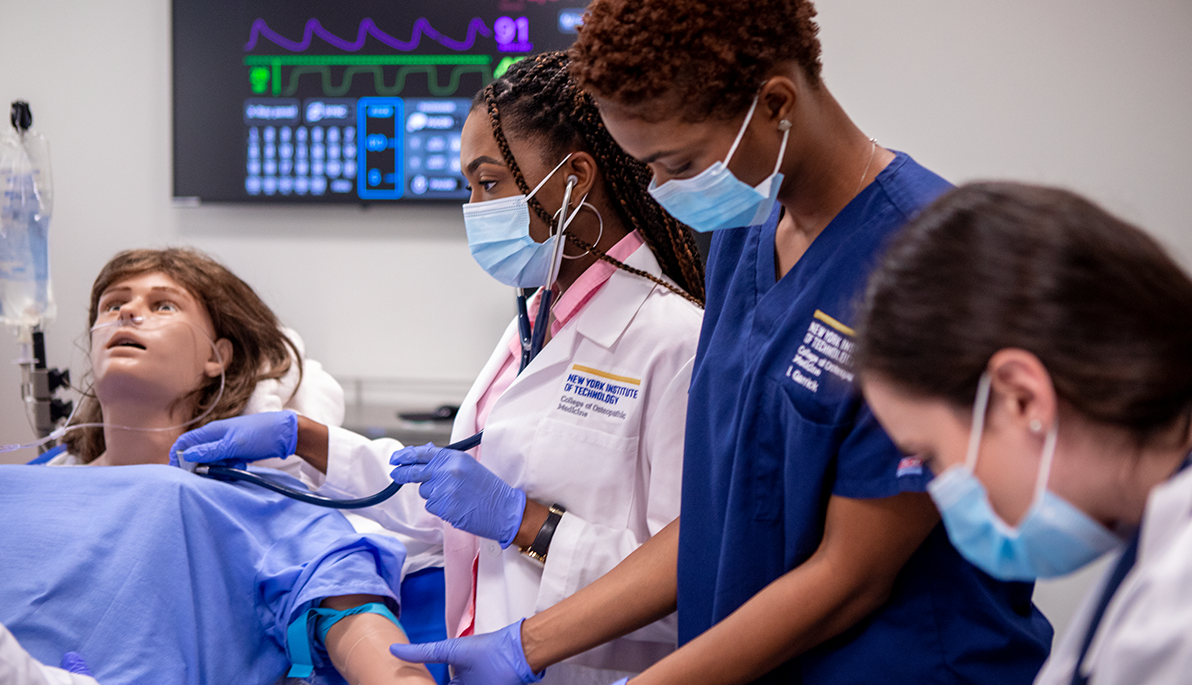News
Recognizing American Heart Month
February 1, 2023
According to the Centers for Disease Control and Prevention (CDC), heart disease is the leading cause of death in the United States, with nearly half of Americans having at least one of three key risk factors for heart disease: high blood pressure, high blood cholesterol, or smoking.
Since 1963, the United States government has annually recognized February as American Heart Month, a time to raise awareness for heart disease and educate Americans about lifestyle improvements that could reduce their risk of developing cardiovascular disease.
Physicians and experts from the College of Osteopathic Medicine (NYITCOM) also do their part, including sharing potentially life-saving information with the campus community and patients. For example, experts emphasize that the signs of a heart attack can differ between men and women, with women likely to experience other symptoms, in addition to chest pain, that are not traditionally associated with a heart attack.
“Women’s heart attack symptoms can be very different from men and may be very atypical. They may not just be chest pain, or chest pressure, but could be vomiting, epigastric or abdominal pain,” says NYITCOM’s Chief of Cardiology and Director of Medical Device Innovation Todd Cohen, M.D., a triple-boarded, practicing cardiologist.
Of course, NYITCOM’s dedication to advancing cardiovascular health goes well beyond American Heart Month. Here are notable select highlights of research, awards, and public education efforts taken by NYITCOM faculty and students in the fight against heart disease.
Innovative Research
NYITCOM and St. Francis Hospital and Heart Center®’s DeMatteis Center for Cardiac Research and Education recently launched a collaboration in which NYITCOM students now have the prestigious opportunity to join St. Francis Hospital’s world-renowned, innovative cardiovascular research. The program’s first NYITCOM research scholar, Karen Chau, is currently assisting in a cardiac imaging study that visualizes calcium salt buildup (plaque) in the arteries that deliver blood to the heart.
Last April, NYITCOM students Victor Chen and Nibras Choudhury and Associate Professor of Biomedical Sciences Youhua Zhang, M.D., Ph.D., shared research at the 2022 meeting of the American Physiological Society, which found that older individuals may be more vulnerable to irregular heart rhythms (arrhythmia) caused by high caffeine consumption.
In 2020, NYITCOM researchers, including Professor and Chair of Biomedical Sciences Anthony (Martin) Gerdes, Ph.D., and faculty members Kaie Ojamaa, Ph.D., Zhang, and Bardia Askari, Ph.D., collaborated with FuWai Heart Hospital (Beijing, China) to propose a new use for a common blood test, which could provide potentially life-saving treatments for heart failure. Two years prior, in an effort to offer new treatments for recovering heart attack patients with beta blocker intolerance, Gerdes and other researchers also discovered that thyroid hormone therapy—specifically triiodothyronine (T3)—may serve as an effective alternative treatment.
NYITCOM-Arkansas Associate Professor and cardiovascular medicine researcher Viswanathan Rajagopalan, Ph.D., has also conducted extensive research on the impact of thyroid hormone on heart function. In a 2018 study, Rajagopalan, who is also a Fellow of the Cardiovascular Section of the American Physiology Society, and his co-authors explore whether a persistent decrease in thyroid hormone levels may compromise heart function.
A 2017 study by NYITCOM Associate Professor Brian Beatty, Ph.D., former NYITCOM faculty Bennett Futterman, M.D., and then medical student Christopher Hoehmann (D.O. ’18) proposed that arteries in peripheral areas of the body, like the wrist, may help clinicians to diagnose reduced blood flow to the heart.
The same year, Associate Professor of Biomedical Sciences Maria Alicia Carrillo Sepulveda, Ph.D., and then medical student Benjamin Kramer (D.O. ’19) conducted research funded by the American Heart Association (AHA). Their findings showed that the Western diet, which is categorized by excessively high levels of fat and refined sugars, caused metabolic syndrome (prediabetes) in male rats.
Prestigious NIH Grants
Last year, an NYITCOM research team, led by Biomedical Sciences Instructor Satoru Kobayashi, Ph.D., secured a three-year $428,400 grant from the National Institutes of Health (NIH) National Heart, Lung, and Blood Institute to support research that may deliver life-saving treatments for diabetic heart failure.
In 2021, a research team led by Olga V. Savinova, Ph.D., assistant professor of biomedical sciences at NYITCOM, secured a five-year grant estimated at $1.8 million from the NIH National Heart, Lung, and Blood Institute for research that aims to improve the understanding of atherosclerosis (hardening of the arteries) and deliver a new treatment for heart disease. In 2018, she also received a $391,041 grant from the NIH National Heart, Lung, and Blood Institute for research that examines vascular calcification that could help to prevent heart disease in chronic kidney disease patients.
Qiangrong Liang, Ph.D., professor of biomedical sciences, was awarded a three-year $431,700 grant from the NIH National Heart, Lung, and Blood Institute in 2014 to study the effects of reducing caloric intake on the heart.
Illustrious Awards
Last year, NYITCOM student Nikki Maddie secured a prestigious AHA Scholarship in Cardiovascular Disease to study the link between obesity and hypertension under Sepulveda’s mentorship. Two years prior, Maddie also received a 2020 AHA Hypertension New Investigator Award for research regarding the connection between obesity and the fat around the aorta, known as PVAT (perivascular adipose tissue).
In 2021, NYITCOM student Risa Kiernan secured the AHA’s Scholarship in Cardiovascular Disease. Under Sepulveda’s mentorship, Kiernan is studying how obesity leads to hypertension in females.
In 2017, Gerdes received the Hans Peter Krayenbuehl Memorial Award from the International Academy of Cardiology for his contributions to the field of cardiac function.
Public Service and Education
Two years ago, in an effort to connect NYITCOM medical students with children and adolescents from underserved communities, NYITCOM students Melody Young and Jacob Salner shared their book Rory’s Adventure Through the Cardiovascular System with third-graders from the Glen Cove City School District. The educational tale chronicles main character Rory’s journey through the heart, blood, veins, and arteries.
In 2019, NYITCOM-Arkansas debuted its Delta Care-a-van, a mobile medical unit used to improve the quality of health services and education in rural, underserved communities in the Mississippi Delta Region via free-of-cost preventative health services. Among the Care-a-van’s offerings are blood pressure and blood glucose screenings, which may indicate hypertension and diabetes, respectively.





